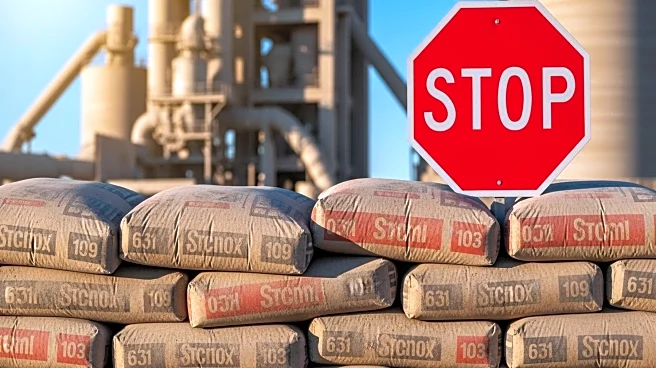What's Happening?
The Trump administration has halted a $500 million grant intended for a carbon capture project at the Heidelberg cement plant in Mitchell, Indiana. This decision has left the local community and the cement industry in shock, as the project was expected to significantly reduce carbon dioxide emissions from cement manufacturing. The cancellation is part of a broader effort by the administration to cut funding for initiatives linked to global warming. The Heidelberg plant was set to be a model for reducing emissions in the cement industry, which is responsible for a substantial portion of global greenhouse gases. The decision has raised concerns about the U.S.'s ability to compete in the global market for low-carbon cement, as other countries are increasingly mandating cleaner products.
Why It's Important?
The cancellation of the carbon capture project has significant implications for the U.S. cement industry and its ability to innovate and compete globally. Cement manufacturing is a major source of carbon emissions, and the demand for low-carbon cement is rising as countries and states implement stricter environmental regulations. The decision to halt the project could hinder the U.S.'s ability to lead in developing technologies that reduce emissions, potentially allowing China and other countries to dominate the market. This move also risks economic opportunities, as the project promised to create jobs and boost local production capabilities, reducing reliance on imported cement.
What's Next?
The Heidelberg plant and other affected companies are appealing the decision, arguing that the projects align with national priorities and could significantly reduce emissions. The industry is likely to continue pushing for support and funding to develop low-carbon technologies. Meanwhile, the U.S. risks falling behind in the race to innovate in the cement sector, as international demand for cleaner products grows. The outcome of these appeals and the administration's stance on clean technology incentives will be crucial in determining the future of the U.S. cement industry.
Beyond the Headlines
The decision to block the carbon capture project highlights the tension between economic growth and environmental sustainability. It raises ethical questions about the responsibility of industries and governments to address climate change. The move could also influence public perception and policy debates around clean technology and environmental regulations, potentially affecting future elections and policy decisions.









